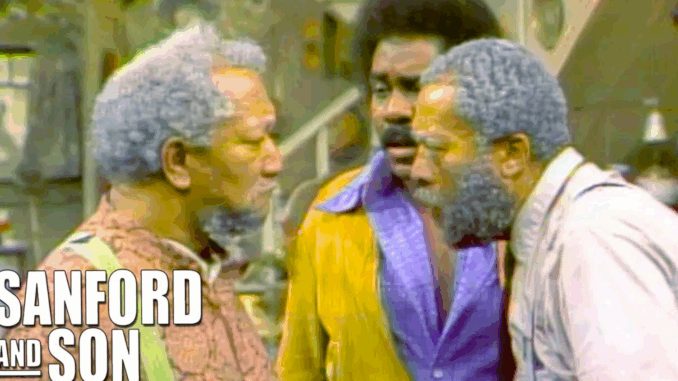
The Unexpected Star of Watts
When people think of Sanford and Son, the first name that springs to mind is usually Redd Foxx’s unforgettable Fred G. Sanford. But ask any longtime fan about the true heart of the show, and you’re bound to hear another name rise just as quickly: Grady Wilson.
Played with pitch-perfect comedic awkwardness by Whitman Mayo, Grady wasn’t originally intended to be the breakout character he became. And yet, his mumbled catchphrases, slow stumbles into rooms, and lovable confusion earned him a permanent spot in the sitcom hall of fame — not just as Fred’s best friend, but as a symbol of a different kind of comedic genius.
From Background Buddy to Fan Favorite
Grady’s rise was unusual. When Sanford and Son premiered in 1972, he was just a supporting character. But when Redd Foxx briefly left the show over a contract dispute during Season 3, NBC needed someone to fill the gap. Enter Grady, the bumbling neighbor who suddenly found himself in charge of the junkyard — and the series.
To everyone’s surprise, Grady didn’t just keep the show alive during Foxx’s absence — he kept audiences laughing. His mispronunciations (“Fred, I got the heebie-jeebies!”), exaggerated shuffles, and unique blend of innocence and absurdity captured something rare: the ability to make audiences feel safe, even in chaos.
The Spinoff That Almost Was

NBC even tried to spin Grady off into his own series, Grady, in 1975. The show followed him as he moved to live with his daughter in Los Angeles. It only lasted ten episodes, but its mere existence spoke volumes: a character once seen as comic relief was now trusted to carry a primetime sitcom.
While Grady didn’t find its footing, Mayo returned to Sanford and Son with even more affection from fans. His absence had been felt — and his return welcomed with open arms.
Why Grady Still Matters
Grady’s charm wasn’t just in his lines, but in his essence. At a time when African American characters on TV were often forced into narrow tropes, Grady was something different. He was silly, but never mean. Old, but never out of touch. He was confused, yes, but deeply loyal and never afraid to show love — especially to Lamont, whom he treated like a nephew.
In many ways, Grady embodied a part of Black elderhood that hadn’t often been explored onscreen: the neighbor who shows up without asking, who doesn’t always understand what’s happening, but always has your back.
Whitman Mayo’s Quiet Brilliance
Offscreen, Whitman Mayo was a serious actor with roots in the theater. His portrayal of Grady was carefully crafted — the stooped walk, the drawn-out voice, the darting glances. He understood the power of understatement. It’s what made Grady so believable, even in the most ridiculous moments.
Mayo continued to act in films and television after Sanford and Son, but Grady remained his most enduring role. And though he passed away in 2001, his legacy lives on — not just in reruns, but in the DNA of every sitcom sidekick who steals the show without ever meaning to.
The True Legacy of Grady Wilson
Grady wasn’t just a friend to Fred Sanford. He was a friend to the audience — a reminder that laughter often comes from the unexpected corners of life. He never needed the spotlight to shine. In fact, the dimmer the moment, the brighter Grady seemed to glow.
In a world full of scene-stealers and punchline chasers, Grady Wilson remains a rarity: a character so gentle, so peculiar, and so deeply human, that we still remember him decades later — not for what he said, but for how he made us feel.
And that, more than any joke, is the true genius of Sanford and Son.